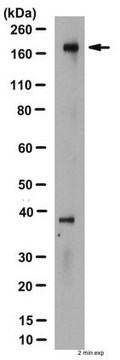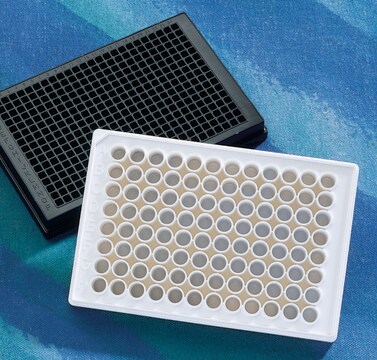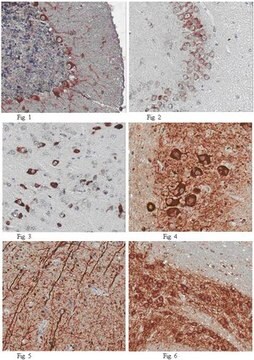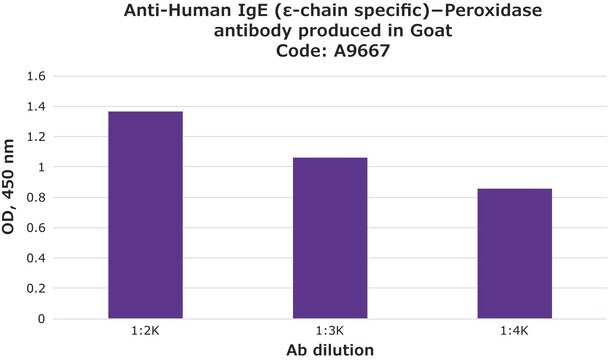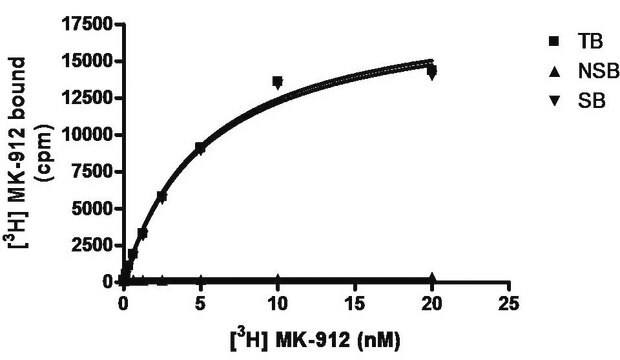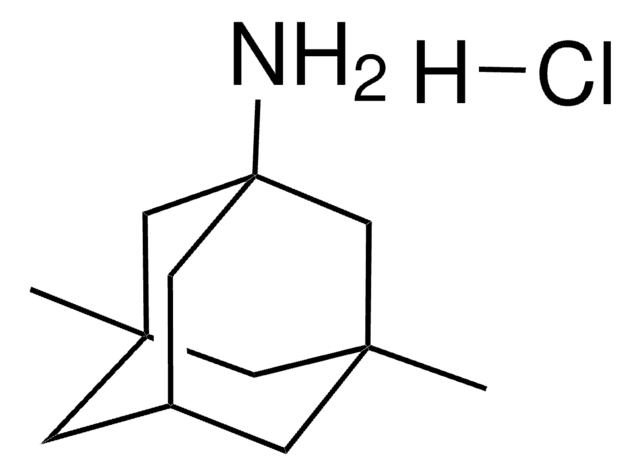HTS068M
ChemiSCREEN Membrane Preparation Recombinant Human APJ Apelin Receptor
Human APJ GPCR membrane preparation for Radioligand binding Assays & GTPγS binding.
Iniciar sesiónpara Ver la Fijación de precios por contrato y de la organización
About This Item
Código UNSPSC:
41106514
eCl@ss:
32161000
NACRES:
NA.81
Productos recomendados
origen biológico
human
Nivel de calidad
recombinante
expressed in Chem-1 cells
fabricante / nombre comercial
ChemiScreen
Chemicon®
técnicas
ligand binding assay: suitable (GTPγS)
radioligand binding assay (RLBA): suitable
Nº de acceso NCBI
Nº de acceso UniProt
Condiciones de envío
dry ice
Información sobre el gen
human ... APLNR(187)
Descripción general
Apelin peptides have been discovered to be a family of peptides of different sizes that is derived from the N-terminus of a 77 amino acid precursor peptide (preproapelin) (Hosoya et al., 2000). Apelin receptor (APJ) is a G protein-coupled receptor that is activated by several apelin fragments. APJ activation leads to the inhibition of cAMP production. APJ and apelin peptides have been found to be involved in the regulation of cardiovascular function (Katugampola et al., 2001) and fluid homeostasis (Reaux et al., 2001). Broad roles of apelin system has been established in lowering blood pressure, as a potent cardiac inotrope, in modulating pituitary hormone release and food and water intake, in stress activation, and as a novel adipokine that is excreted from fat cells and regulates insulin (Lee et al., 2006) . Millipore′s APJ membrane preparations are crude membrane preparations made from our proprietary stable recombinant cell lines to ensure high-level of GPCR surface expression; thus, they are ideal HTS tools for screening of agonists and antagonists of APJ. The membrane preparations exhibit a Kd of 0.4 nM for [125I]-Apelin. With 0.25 nM [125I]-Apelin, 5 g/well APJ Membrane Prep typically yields greater than 20-fold signal-to-background ratio.
Full-length human AGTRL1 cDNA encoding APJ
Aplicación
Radioligand binding assay and GTPγS binding.
Acciones bioquímicas o fisiológicas
GPCR Class: A
Protein Target: APJ
Target Sub-Family: Apelin
Calidad
Table 1. Signal:background and specific binding values obtained in a competition binding assay with varying amounts of APJ membrane prep.
SPECIFICATIONS: 1 unit = 5 µg membrane preparation
Bmax for [125I]-Apelin binding: 3.85 pmol/mg protein
Kd for [125I]-Apelin binding: ~0.4 nM
| 10 µg/well | 5 µg/well | |
|---|---|---|
| Signal:Background | 33 | 50 |
| Specific Binding (cpm) | 17297 | 15015 |
SPECIFICATIONS: 1 unit = 5 µg membrane preparation
Bmax for [125I]-Apelin binding: 3.85 pmol/mg protein
Kd for [125I]-Apelin binding: ~0.4 nM
Especificaciones
Inucbation Conditions
Membranes are mixed with radioactive ligand and unlabeled competitor (see Figures 1 and 2 for concentrations tested) in binding buffer in a nonbinding 96-well plate, and incubated for 1-2 h. Prior to filtration, an FC 96-well harvest plate (Millipore cat. # MAHF C1H) is coated with 0.33% polyethyleneimine for 30 min, then washed with 50mM HEPES, pH 7.4, 0.5% BSA. Binding reaction is transferred to the filter plate, and washed 3 times (1 mL per well per wash) with Wash Buffer. The plate is dried and counted.
Binding buffer: 50 mM Hepes, pH 7.4, 5 mM MgCl2, 1 mM CaCl2, 0.2% BSA, filtered and stored at 4°C
Radioligand: [125I]-Apelin. (Perkin Elmer#:NEX-393 )
Wash Buffer: 50 mM Hepes, pH 7.4, 500mM NaCl , 0.1% BSA, filtered and stored at 4°C.
One package contains enough membranes for at least 200 assays (units), where a unit is the amount of membrane that will yield greater than 20-fold signal:background with 125I labeled Apelin at 0.25 nM
Membranes are mixed with radioactive ligand and unlabeled competitor (see Figures 1 and 2 for concentrations tested) in binding buffer in a nonbinding 96-well plate, and incubated for 1-2 h. Prior to filtration, an FC 96-well harvest plate (Millipore cat. # MAHF C1H) is coated with 0.33% polyethyleneimine for 30 min, then washed with 50mM HEPES, pH 7.4, 0.5% BSA. Binding reaction is transferred to the filter plate, and washed 3 times (1 mL per well per wash) with Wash Buffer. The plate is dried and counted.
Binding buffer: 50 mM Hepes, pH 7.4, 5 mM MgCl2, 1 mM CaCl2, 0.2% BSA, filtered and stored at 4°C
Radioligand: [125I]-Apelin. (Perkin Elmer#:NEX-393 )
Wash Buffer: 50 mM Hepes, pH 7.4, 500mM NaCl , 0.1% BSA, filtered and stored at 4°C.
One package contains enough membranes for at least 200 assays (units), where a unit is the amount of membrane that will yield greater than 20-fold signal:background with 125I labeled Apelin at 0.25 nM
Forma física
Liquid in packaging buffer: 50 mM Tris pH 7.4, 10% glycerol and 1% BSA with no preservatives.
Packaging method: Membranes protein were adjusted to the indicated concentration in 1 ml packaging buffer, rapidly frozen, and stored at -80°C.
Packaging method: Membranes protein were adjusted to the indicated concentration in 1 ml packaging buffer, rapidly frozen, and stored at -80°C.
Almacenamiento y estabilidad
Maintain frozen at -70°C for up to 2 years. Do not freeze and thaw.
Información legal
CHEMICON is a registered trademark of Merck KGaA, Darmstadt, Germany
Cláusula de descargo de responsabilidad
Unless otherwise stated in our catalog or other company documentation accompanying the product(s), our products are intended for research use only and are not to be used for any other purpose, which includes but is not limited to, unauthorized commercial uses, in vitro diagnostic uses, ex vivo or in vivo therapeutic uses or any type of consumption or application to humans or animals.
Código de clase de almacenamiento
10 - Combustible liquids
Clase de riesgo para el agua (WGK)
WGK 2
Certificados de análisis (COA)
Busque Certificados de análisis (COA) introduciendo el número de lote del producto. Los números de lote se encuentran en la etiqueta del producto después de las palabras «Lot» o «Batch»
¿Ya tiene este producto?
Encuentre la documentación para los productos que ha comprado recientemente en la Biblioteca de documentos.
Nuestro equipo de científicos tiene experiencia en todas las áreas de investigación: Ciencias de la vida, Ciencia de los materiales, Síntesis química, Cromatografía, Analítica y muchas otras.
Póngase en contacto con el Servicio técnico